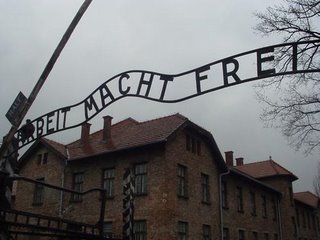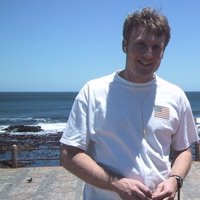
Elie Wiesel, Night (new translation, 2006)
Perhaps Elie Wiesel is the poet laureate of holocaust survivors. Night is, by his own admission, his most important work. To say the book is powerful is understatement.
The book is Wiesel's memoir of the holocaust, during which he was just a teenage boy. He wrote this book in Yiddish. His wife Marian — “who knows my voice and how to transmit it better than anyone else” (p. xiii) —has recently retranslated it. He uses a very simple and eloquent writing style; the beauty of his prose and the ugliness of his story are perfectly juxtaposed.
Wiesel means to haunt you, and he succeeds. He writes of a tramp in town, dismissed as a madman, who accurately warned of what was to come; of a hysterical lady in the cattle car, dismissed as a madwoman, who had premonitions of all-consuming flames; of his last glimpse of his mother and sister, as they were herded to their deaths at Birkenau the first night; of the sign over the gate at Auschwitz, Arbeit macht frei (“Work makes you free”); of his silence, even relief, the night his father was beaten to death in Buchenwald.

Wiesel felt called to write this memoir in order to make people remember what happened. He won the Nobel Peace Prize in 1986. The volume closes with his acceptance speech, in which he spoke of the sinfulness of remaining aloof:
“We must take sides. Neutrality helps the oppressor, never the victim. Silence encourages the tormentor, never the tormented. Sometimes we must interfere. When human lives are endangered, when human dignity is in jeopardy, national borders and sensitivities become irrelevant. Wherever men and women are persecuted because of their race, religion, or political views, that place must — at that moment — become the center of the universe.” (p. 118-119)
“As long as one dissident is in prison, our freedom will not be true. As long as one child is hungry, our life will be filled with anguish and shame. What all these victims need above all is to know when their voices are stifled we shall lend them ours, that while their freedom depends on ours, the quality of our freedom depends on theirs.” (p. 120)
In one sense, work did make Wiesel free. Because he was given work as a laborer, the Germans never got around to murdering him. The day came when an American tank rattled its way to the gates of Buchenwald, and he was finally free.
But not really free. Not free from the memories. Not free from the sorrow. Not free from the duty of making the world remember.


No comments:
Post a Comment